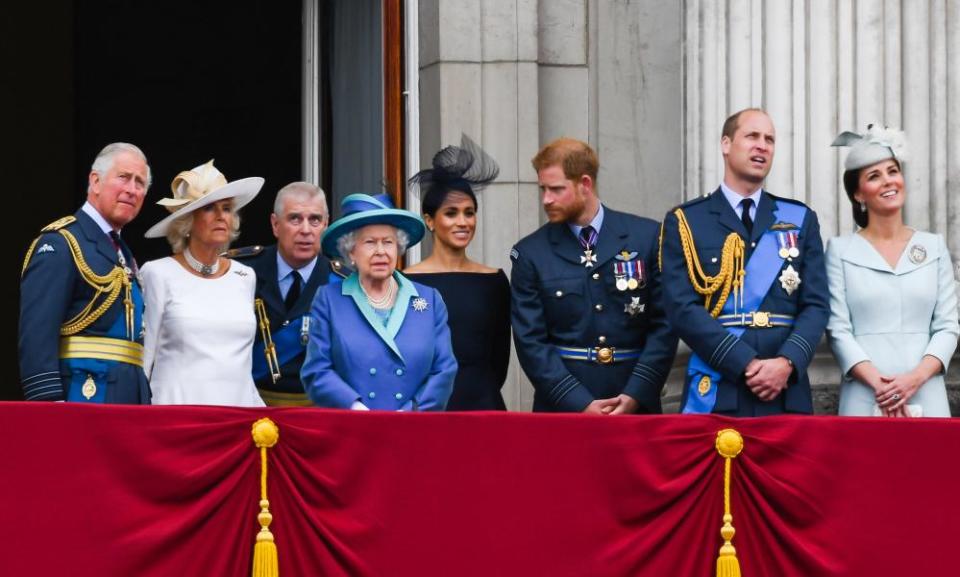As Meghan has learned, the monarchy is still built on breeding, ancestry and caste

They wanted to know how dark his skin would be. An unborn child about to enter the British royal family was already considered a potential worry and even a liability because one of his grandmothers happened to be African American, and the “stain” this might leave on his skin and their reputations had to be considered, and prepared for. These are among the many shocking revelations of Meghan and Prince Harry’s jaw-dropping interview with Oprah Winfrey.
I’m not wholly surprised that a royal family member expressed concern about the “reputational” impact of having a dark-skinned child in their midst – considering the long history of exclusion of anyone Roman Catholic, non-aristocratic or disabled from their rarefied world. Yet to add to that sense of rejection, Archie has not been given either a title or security.
The intensity of this royal drama is startling considering the halcyon days around the time of the engagement and wedding of Harry and Meghan just three years ago. Indeed, when Meghan Markle was first linked with Harry, she looked much like her future sister-in-law, Kate Middleton – and I, like many people, did not know that Meghan had any Black ancestry at all. The poker-straight hair, the pale skin, the thin frame and expensive style made Meghan seem just another European royal bride out of central casting. But then tabloid headlines screeching “straight outta Compton” and poring over her mother’s “slave ancestry” made it clear that she wouldn’t be treated as such. The merest suggestion of Black genes entering the bloodstream of the Saxe-Coburg-Windsor dynasty made this already fragile little country start to tear apart.
Meghan has become the ghost at the table, an unwelcome reminder of this country’s inability to step forward into a modern world where women have their own opinions and desires, where the old caste system is dismantled, where the “piccaninnies” of our prime minister’s crude imagination represent our country abroad.
It is painful for me, as a republican, to have to step out in defence of any member of the royal family but I feel as though Meghan, Duchess of Sussex is receiving the ire intended for a much larger target of young Black women who have stormed into previously closed-off institutions. I have lost count of the times that I have been told I must have been accepted to Oxford because of positive discrimination (as if the university would ever adopt such a policy, as its woefully undiverse admissions record shows).
I’ve been told I was only published because I was “exotic”; and that any award I have received is a sign of “wokeism” or decreasing discernment among judges. All of these snide comments clearly reveal more about the insecurities and resentments of those making them than anything about me, but they do make me understand why Meghan would want to withdraw from such a toxic environment.
The noise recently against “cancel culture” clearly doesn’t extend to trying to protect Black women from coordinated and relentless attacks on their looks, abilities or motivations. The rearguard instinct to protect privilege and exclusion over all else is clearly a difficult one to overcome.
It is easy for me and others to adopt a posture of defensive silence, never talking about the toll of living, studying and working in environments where we are the only ones. As an insider, the minute you do speak up you are labelled as ungrateful, conniving, nasty or just plain unworthy.
I see the regular, almost feral attacks on Meghan by media figures such as Piers Morgan and others and wonder what he would do with that anger in other situations – for example, if he taught diverse and opinionated students in a university, or worked in an inner-city hospital. His rage is so disproportionate that many people would curl up if confronted with it. Other media figures appear to dismiss the skin-tone comments as “casual racism”, as if that’s acceptable.
I remember how I learned from an early age to bite my tongue, to laugh uncomfortably, to ignore “casual” racism in particular situations, and then to vent to friends who had experienced similar things.
The conversation between Meghan and Oprah is fascinating because of the frank way they talk; a huge, global audience watches as two Black women discuss the outrageous experiences of one of them and hear all of the gory, suppressed details for the first time. Oprah gasps as she hears what Meghan and Harry have had to put up with.
An ancient British institution tamed by an unprecedented level of public scrutiny from two world-famous Black women. I never expected to see it, the silenced becoming the silencer.
Discussions take place regarding who or what Meghan is, whether she is a “Black woman” or not, whether she is facing racism or not. Whatever, the truth is that blood and all the meaning that word carries is still very important in Britain and beyond. What you look like, what your parentage is, makes you belong somewhere if you’re lucky – or face rejection if you are not.
Breeding, ancestry, caste are the building blocks of the monarchy and aristocracy and still determine who we believe is superior and inferior. I dread to think what would have happened to Meghan if she’d had the temerity to marry the heir rather than the spare.
Nadifa Mohamed is a British-Somali novelist

 Yahoo Finance
Yahoo Finance 